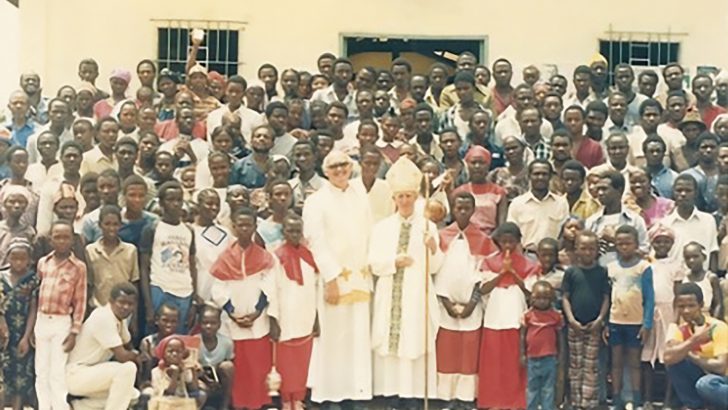What is your Business? Memories of life, especially from my 23 years missionary work in Sierra Leone, West Africa
by Fr Willie Kingston, CSSp (CRM Publications/Spiritan Heritage and Archives, Kimmage Manor, Dublin, €20.00/€30.00 postage paid)
Daniel Murphy in his magisterial A History of Irish Emigrant & Missionary Education, published in 2001, describes the significant contribution made by Irish missionaries to the provision of education in ‘Third-World countries’, not least in the continent of Africa.
In this interesting and valuable autobiography Fr Willie Kingston provides a meticulous account of how the establishment, staffing and administration of schools was at the heart of their evangelising.
Fr Kingston was born at Maulnageragh, near Clonakilty, Co. Cork, on August 24, 1941. After attending the local national school he was a boarder in the college conducted by the Cistercian monks in Mount Melleray, Co. Waterford. He entered the Congregation of the Holy Ghost in September 1960 and was ordained in July 1968.
Missionary
Following his ordination, Fr Kingston was appointed to be a missionary in Sierra Leone. In 1969 with two colleagues he arrived at Freetown, capital of Sierra Leone, after a sea journey of more than a week. There he learned that his mission station was the furthest from the capital in the most remote part of the country and was located near the border with Liberia.
He also learned that the area had become notorious because of widespread illegal diamond mining and smuggling. He was the new parish priest of Koidu in the district of Kono. He discovered that there were few roads in the area and that the physical conditions were most challenging. It was not without reason that such areas in Sierra Leone had become known as ‘the white man’s grave’ in early colonial days.
Parishes
Between 1969 and 1992 Fr Kingston served in six different parishes in eastern Sierra Leone. Like his colleagues, apart from providing Mass and the sacraments, he busied himself establishing schools for the children in the villages, which had been entrusted to his pastoral care. He and his confrères also dedicated themselves to improving the lot of the people in areas other than in education. The support of the tribal chiefs was essential to the successful establishment of the parish schools. Fr Kingston describes the formal steps which had to be taken to that end. Each interaction would begin with the chief enquiring: “What is your business?”
The challenges of missionary life were further compounded for Fr Kingston and his fellow missionaries by a civil war between the Revolutionary United Front (RUF) and the government forces from 1991– 1994. The eastern part of Sierra Leone was overrun from time to time by the rebels. The missionaries and thousands of people had to repeatedly flee from the area. In so doing, Fr Felix McAllister, CSSp, was ambushed and killed by the rebels in March 1994. In the same incident a doctor from Holland, who had volunteered his services to Fr McAllister’s mission, was also killed along with his wife and child. Fr Kingston records that when the government soldiers recovered control of areas they tended to be as destructive and murderous as the rebels.
Re-assigned
Fr Kingston was re-assigned to Ireland in December 1992. In a gracious vale to Sierra Leone he writes: “I have beautiful memories of its people and the country. I thank all who helped me in my missionary work, especially catechists, teachers, confrères, superiors and bishops.”
He concludes his inspiring memoir with a description of his continuing ministry during his ‘retirement years’ at the congregation’s colleges at Templeogue and Rockwell.
This book is lavishly illustrated with pictures from every period of the author’s life-story. One of the most-evocative is that of Kissi Road Cemetery in Freetown, where not a few Irish missionaries lie buried.


 Bishop John O’Riordan and a group of parishioners at Kissi Bendon parish.
Bishop John O’Riordan and a group of parishioners at Kissi Bendon parish. 